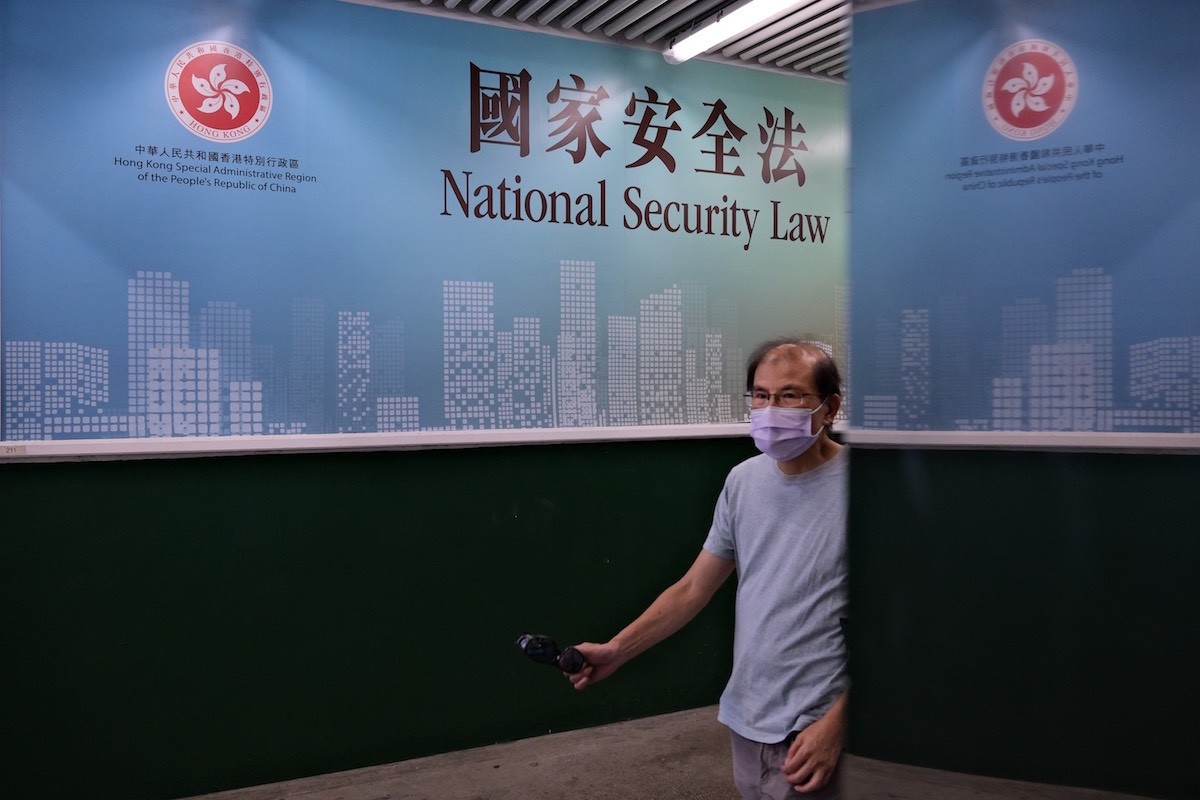Hong Kong national security police on Tuesday arrested two more people with ties to a now-defunct fund set up to help those targeted for involvement in the 2019 protest movement.
Police arrested two men aged 33 and 59 in Tai Po on suspicion of “colluding with the 612 Humanitarian Relief Fund to receive donations from various overseas organizations to support people who have fled overseas or organizations which called for sanctions against Hong Kong,” according to a statement posted to the government’s website.
The men were also suspected of “conspiracy to incite others to commit riot,” under public order laws, the statement said.
“Police conducted searches at the residences of the two arrested persons and another suspect with court warrants,” the statement said. “Some related computers, electronic communication devices, and exhibits fit for unlawful purpose were seized.”
Earlier this month, police arrested 10 people in connection with the now-disbanded fund’s activities. The arrests of outspoken Cardinal Joseph Zen and other trustees of the fund prompted an international outcry in May 2022.
Since the ruling Chinese Communist Party tightened its control over an ongoing crackdown on dissent in Hong Kong in July, police have started focusing on overseas activists, issuing bounties for eight prominent overseas campaigners, and hauling their family members in for questioning.
The national security law – imposed by Beijing on Hong Kong on July 1, 2020 – ushered in a citywide crackdown on public dissent and criticism of the authorities that have seen senior journalists, pro-democracy media magnate Jimmy Lai, and 47 former lawmakers and democracy activists charged with offenses from “collusion with a foreign power” to “subversion.”
It applies to speech and acts committed anywhere in the world and has been used to issue the leaders of London-based rights group Hong Kong Watch with a takedown order for the group’s website.
Hong Kong leader John Lee has vowed to pursue the eight overseas activists – who include former democratic lawmakers Ted Hui and Nathan Law and businessman Elmer Yuen – for the rest of their lives.
‘I would be the ninth’
Cantonese language activist Andrew Chan, who disbanded his campaign group Societas Linguistica Hongkongensis on Monday after national security police told him to take down an essay from its website, said police had also mentioned the eight overseas activists to him.
“They specifically mentioned the eight overseas Hong Kongers as an example, and told me I would be the ninth wanted person if I didn’t remove the essay,” said Chan, who is currently also overseas.
“They also told me that if I didn’t cooperate, the police have the power to arrest members of my family,” said Chan, adding that campaigning for Cantonese-medium instruction in Hong Kong’s schools is equated with support for “Hong Kong independence” in the eyes of the Chinese government.
“When we applied for community funding in 2020, some establishment organizations labeled us as radical and anti-China,” he said. “In today’s Hong Kong, any initiatives that support local culture can easily be labeled pro-independence, and initiatives like ours that campaign against the enforced speaking of Mandarin [in schools] have been classified as seditious, subversive or separatist in the eyes of the government.”
Current affairs commentator Sang Pu said Chan’s group represents the celebration of everything that is unique about Hong Kong’s culture and is therefore seen as a threat by the authorities.
“National security isn’t just about political security, but also cultural security,” Sang said. “The Chinese Communist Party believes that Hong Kong’s political insecurity stems from its unique culture, which gives the people of Hong Kong a sense of their unique identity.”
“This attitude to the language of Hong Kong, but also things like the song ‘Glory to Hong Kong‘, are not just single incidents, but show the way the system is moving to exterminate Hong Kong’s culture,” he said. “It’s part of a bigger game in which Hong Kong’s identity must be suppressed or deracinated.”
Isaac Cheng, founder and director of the U.K.-based Hong Kong advocacy group Kongtinue, said he is concerned that there will soon be more concerted attempts by the authorities to suppress Cantonese.
“They deal with a Cantonese essay competition and a group campaigning for the preservation of Cantonese in the name of national security,” Cheng said. “I’m very worried that insisting on speaking Cantonese instead of Mandarin … will be viewed as an act of confrontation against the government.”
Hong Kong Watch said the Chinese government has failed to deliver on the promises enshrined in the 1984 Sino-British Joint Declaration and called on British Foreign Secretary James Cleverly to raise the issue with Beijing on his trip to China this week, and called for the release of all political prisoners in Hong Kong.
“We urge the Foreign Secretary to make it clear that any stabilization of relations between the UK and the People’s Republic of China will be dependent on … the upholding of respect for the rights, freedoms, and autonomy of the people of Hong Kong,” Hong Kong Watch chief executive Benedict Rogers said in a statement on Tuesday.
“This must include the release of all political prisoners in Hong Kong, in particular the former owner of Apple Daily Jimmy Lai, who is a British citizen, and other prisoners whose families possess British passports or British National Overseas passports,” he said.
